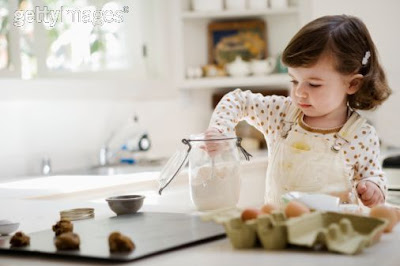So I've been trying to learn to cook more. Its a slow process, but I've been taking classes and reading cooking magazines. I'm definitely getting bettter and better, so I thought I would share some of the interesting things I have learned along the way.
Cheese
Never buy pre-grated cheese - they coat grated cheese with chemicals so that the cheese particles don't stick together. These chemicals can also stop your cheese from melting and mixing into your food smoothly.
Butter
Never microwave butter to soften it for baking. You can speed the process significantly by cutting butter into tablespoon-sized portions and letting it stand at room temperature. Properly softened butter should yield slightly to gentle pressure, but you dont want to be able to sink your finger way down into it. Too-soft butter means your cookie dough will be more like batter, and it will spread too much as it bakes and lose shape.
Baking Soda
When using baking soda always buy a fresh box. It spoils quickly and if its gone bad your cookies wont rise!
Garlic
Never buy the diced garlic in the super market. They soak it in citric acid and it no longer tastes like garlic. An alternative is to throw a bunch of garlic cloves into a food processor and then freeze the mashed garlic into ice cubes.
When a recipe calls for you to saute garlic be extremely careful. Garlic burns very easily and it is best to cook just until fragrant and move to the next step.
Measuring
Don't overpack your dry ingredients into measuring cups. The proper way to measure flour is to lightly spoon it into measuring cups and then level with a knife.
Stovetop Cooking
Make sure your pan is hot before you throw your food in. If your pan isnt hot your food will stick to the pan. Also a hot pan is essential for sauteing veggies or creating a crust on meat, fish, and poulty.
If your oil smokes it has burned. Its best to pour it out, wash the pan, and start over.

Juicy Meat
Give your meat time to rest after cooking. Plan your meals so that the meat you roast, grill, sear, or saute has time to rest at room temperature after its pulled from the heat. Small cuts like steak or chicken breasts can rest for five minutes. Whole birds or rib roasts will requre 20 to 30 minutes. Meat sweats when you cook it and it needs time to reabsorb those juices. If you don't let the meat rest the juices will run all over your cutting board, leaving the meat dry.
Chocolate
Whenever you are making a recipe that calls for melting chocolate resist the temptation to buy chocolate chips. Just like pre-grated cheese, Chocolate chips are also coated with chemicals to prevent them from sticking together.
Thats it for now. Hope you've enjoyed my cooking tips!









2 comments:
oh, that's a lot of tips!! I totally did not kno that about grated cheese. I've been grating my own until the babies came home... now I'm lazy and I buy it grated. Maybe I should go back to what I was doing before!!!
Jeremy and I were just talking about salted and unsalted butter. I buy it unsalted and he salted and I told him that I didn't even think I could tell the difference between them. Now I know the reason behind the salt and can trump him with it. hahahahaha~!
Post a Comment